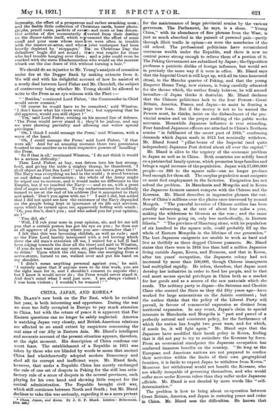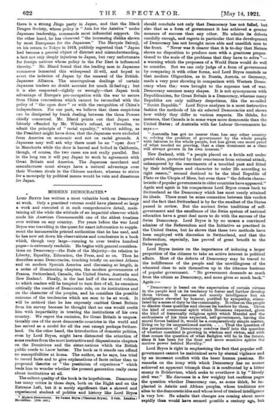CHINA, JAPAN, AND KOREA.* MR. BLAND'S new book on the
Far East. which he revisited last year, is both interesting and opportune. During the war we were too fully occupied in Europe to pay much attention to China, but with the return of peace it is apparent that Far Eastern questions can no longer be safely neglected. America is watching Japan very closely, and British-American relations are affected to no small extent by suspicions concerning the real aims of our Ally in Eastern Asia. Mr. Bland's intelligent and accurate account of the present situation appears, therefore, at the right moment. His description of China confirms our worst fears. The establishment of a Republic in 1911 was taken by those who are blinded by words to mean that ancient China had wholeheartedly adopted modern Democracy and shed all its corrupt and inefficient ways. Mr. Bland finds, however, that under a Republic China has merely exchanged the rule of one set of despots in Peking for the still less satis- factory rule of a score of despots in the several provinces, each playing for his own hand and showing little respect for the central administration. The Republic brought civil war, which still continues between North and South ; but Mr. Bland declines to take this war seriously, regarding it as a more pretext 1• China. Japan, and Korea. By J. 0. P. Bland. London': Hanemann.
net.2 - - • -
for the maintenance of large provincial armies by the various governors. The Parliament, he says, is a sham. " Young China," with its abundance of fine phrases from the West, is just as much absorbed in the pursuit of personal gain—partly through illicit traffic in opium—as wore the mandarins of the old school. The professional politicians have accumulated enormous wealth under the Republic, and there is now no central power strong enough to relieve them of a portion of it. The Peking Government are subsidized by Japan ; the Opposition professes a patriotic dislike of foreign influence, but would act in .precisely the same way if it were in office. Mr. Bland says that the Imperial Court is still kept up, with all its time-honoured ritual, in the Manchu quarter of Peking, and that the young Emperor Hsuan Tung, now sixteen, is being carefully educated for the throne which, the author firmly believes, he will ascend hereafter—if Japan thinks it desirable. Mr. Bland declares that the Chinese politicians look to the four Powers—Great Britain, America, France, and Japan—to assist in floating a large now loan. But if the money is not to be wasted the Powers must, he thinks, insist on the disbandment of the pro- vincial armies and on the proper auditing of the public works accounts. Meanwhile Japanese influence is ever extending. Four hundred Japanese officers are attached to China's Northern armies " in fulfilment of the secret pact of 1918," confirming demands which Japan made in 1915 but nominally withdrew. Mr. Bland found " pillar-boxes of the Imperial (and quite independent) Japanese Post dotted about all over the capital."
Mr. Bland is alive to the urgency of the economic problem in Japan as well as in China. Both countries are solidly based on a patriarchal family system, which promotes large families and brings a rapid increase of the population. Japan with 57,000,000 people—or 380 to the square mile—can no longer produce food enough for them all. The surplus population must emigrate or must find employment in the factories. Emigration has not solved the problem. In Manchuria and Mongolia and in Korea the Japanese farmers cannot compete with the Chinese and the Koreans. Mr. Bland describes in impressive phrases the out- flow of China's millions over the plains once traversed by nomad Mongols. " The peaceful invasion of Chinese settlers has been steadily advancing, at the rate of about four miles a year, making the wilderness to blossom as the rose ; and the same process has been going on, only less methodically, in Eastern Siberia." " The province of Shantung alone, with its population of six hundred to the square mile, could probably fill up the whole of Eastern Mongolia in the lifetime of one generation." The best Japanese emigrants are unable to work as hard and live as thriftily as those dogged Chinese peasants. Mr. Bland states that there were in 1918 less than half a million Japanese living outside Japan, Korea, and Formosa, and that in Korea, after ten years' occupation, the Japanese colony had not increased by more than 200,000, though Chinese immigrants had multiplied rapidly. He infers, therefore, that Japan must develop her industries in order to feed her people, and to that end must secure special privileges in China both as a market for her goods and as a source of the raw materials which she needs. The military party in Japan—the Satsuma and Choshin Clans who control the State as they did fifty years ago—have worked for large annexations on the Asiatic continent ; but the author thinks that the policy of the Liberal Party will prevail, in favour of commercial expansion as distinct from territorial expansion. In any event, Japan's claim to special interests in Manchuria and Mongolia is " part and parcel of a perfectly natural and consistent policy, for the furtherance of which the nation has fought two great wars, and for which, if needs be, it will fight again." Mr. Bland says that the Japanese have modified their harsh policy in Korea, finding that it did not pay to try to assimilate the Koreans by force. From an economical standpoint the Japanese occupation has conferred immense benefits on the country. " So long as the European and American nations arc not prepared to confine their activities within the limits of their own geographical frontiers, it is futile to expect Japan to withdraw from Korea." Moreover, her withdrawal would not benefit the Koreans, who are wholly incapable of governing themselves, and who would suffer more under Korean rulers than they suffer under Japanese officials. Mr. Bland is not dazzled by mere words like" self- determination."
The problem is how to bring about co-operation between Great Britain, America, and Japan in restoring peace and order in China. Mr. Bland sees the difficulties. He knows that
there is a strong Jingo party in Japan, and that the Black Dragon Society, whose policy is " Asia for the Asiatics " under Japanese leadership, commands most influential support. On the other hand, he has observed "the increasing dislike shown by most Europeans for the Japanese." The Marquis Saionji, on his return to Tokyo in 1919, publicly regretted that " Japan had become a general object of distrust and misunderstanding, a fact not only deeply injurious to Japan, but very unfortunate for foreign nations whose policy in the Far East is influenced thereby." Mr. Bland found that the leading men in Japanese commerce lamented this widespread ill-will, and hoped to avert the isolation of Japan by the renewal of the British- Japanese Alliance. The unscrupulous dealings of certain Japanese traders no doubt account for much ill-feeling ; but it is also suspected—rightly or wrongly—that Japan took advantage of Europe's pre-occupation with the war to secure from China concessions which cannot be reconciled with the policy of " tho open door " or with the recognition of China's independence. For our part, we believe that these suspicions can be dissipated by frank dealing between the three Powers chiefly concerned. Mr. Bland points out that Japan was bitterly offended by Mr. Wilson's refusal, at Versailles, to admit the principle of " racial equality," without adding, as the President might have done, that the Japanese were excluded from America on economic and not on racial grounds. A Japanese may well ask why there must be an " open door " in Manchuria while the door is barred and bolted in California, though, of course, the two cases are not really parallel. But in the long run it will pay Japan to work in agreement with Great Britain and America. The Japanese merchant and manufacturer must always have a natural advantage over their Western rivals in the Chinese markets, whereas to strive for a monopoly by political means would be vain and disastrous for Japan.



































 Previous page
Previous page